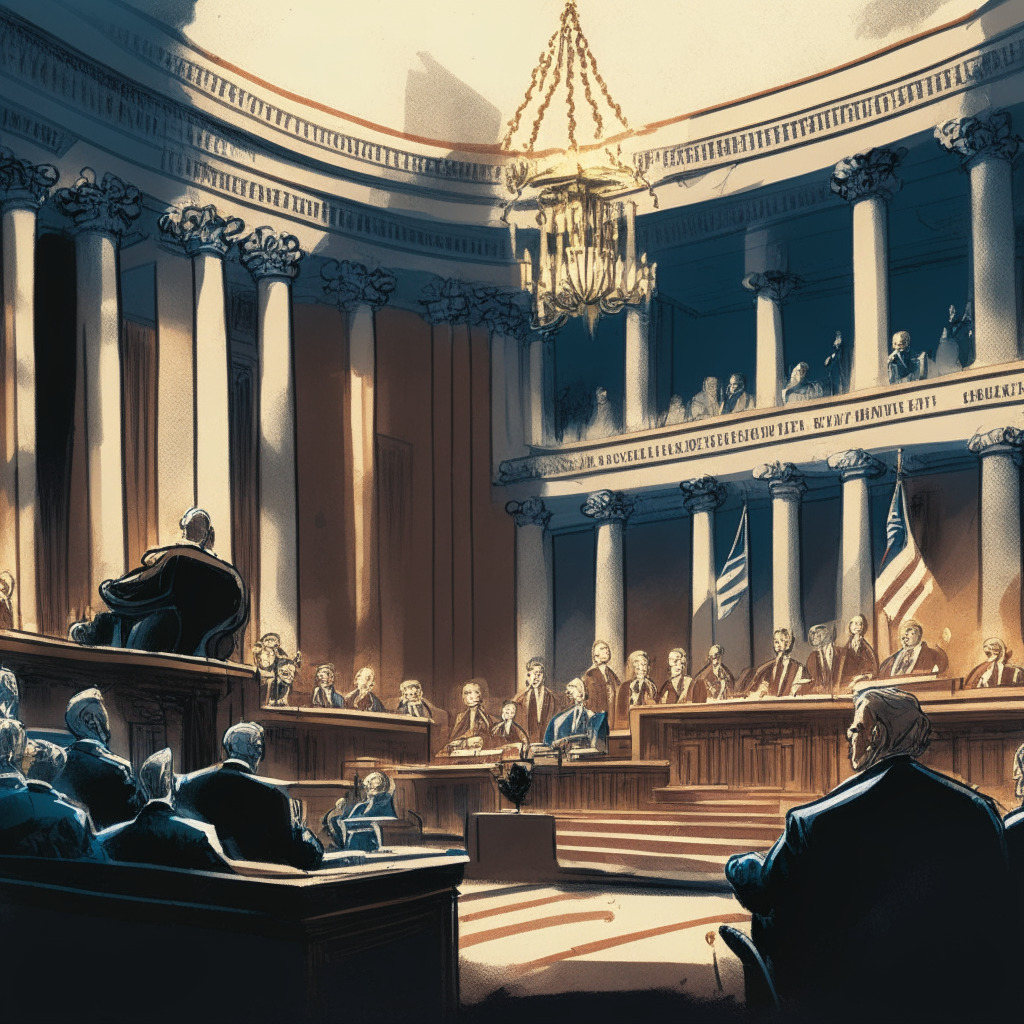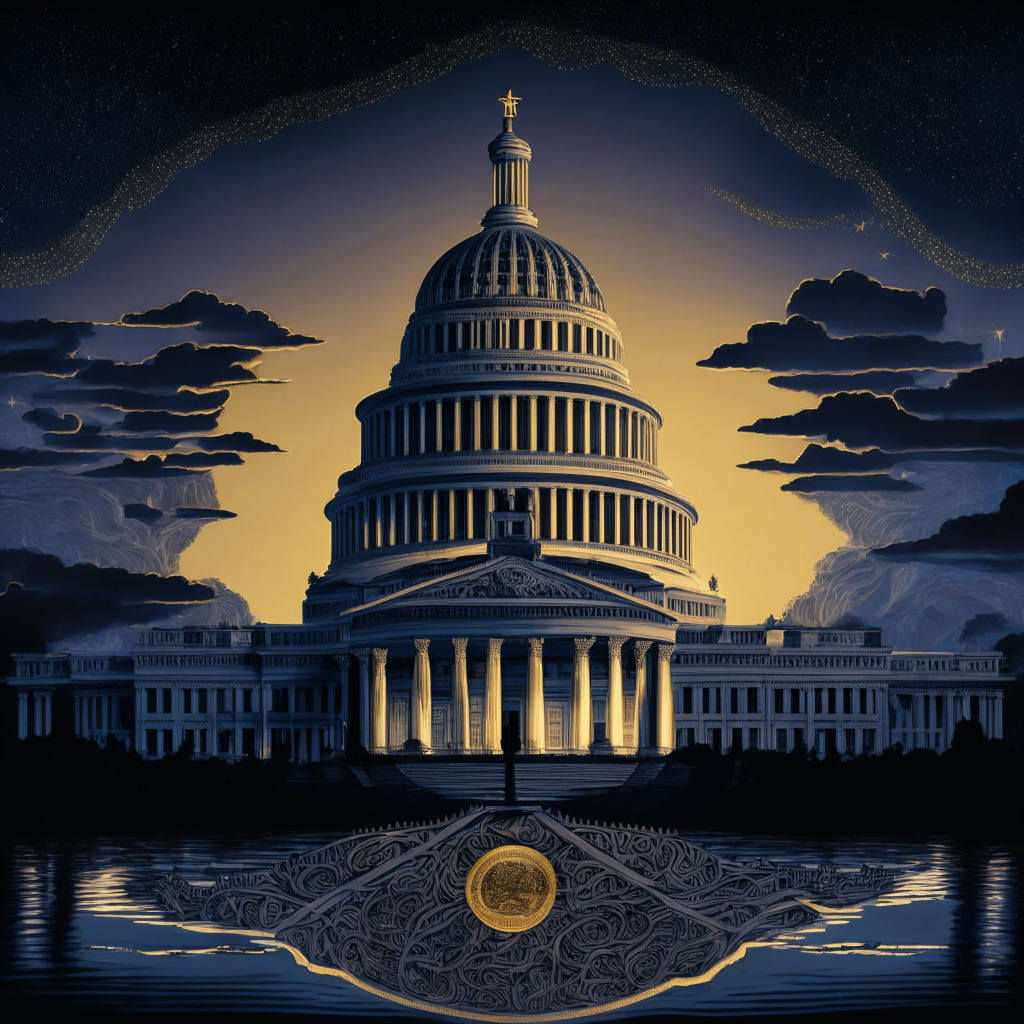“The blockchain technology space is experiencing scrutiny regarding digital assets regulations due to North Korea’s alleged illicit cryptocurrency activities. Reducing such practices necessitates governmental involvement, but regulations should also foster innovation. The balance between regulation for protection and space for innovation will significantly determine the industry’s future.”
Search Results for: Elizabeth Warren
Unmasking Tech Giants: Are Apple’s App Store Policies Stifling Crypto Innovation?
“Recent actions in the technology sector highlight the relationship between tech giants and blockchain and nonfungible tokens (NFTs). A probe into Apple’s App Store policies by US lawmakers aims to analyze if these guidelines indirectly slow technological progress. The lawmakers raise concerns about the impact of Apple’s rules on innovations like distributed ledger technology and NFTs, and potential negative consequences on the US’s status in emerging technology.”
Navigating the New Terrain: Implications of the NDAA Bill on Crypto Privacy and Regulation
The U.S. Senate has passed the National Defense Authorization Act, imposing new regulations on the digital asset world, including privacy coins and crypto mixers. The regulations aim to stem crypto-related fraud and are expected to force an elevation in crypto regulatory standards, obliging authorities to crack down on anonymous crypto transactions. The discourse reflects the conflict between privacy freedoms versus governance needs in the crypto sector.
2024 NDAA and Crypto: Striking Balance between Oversight and Innovation
The United States Senate has passed the 2024 National Defense Authorization Act that targets crypto mixers, crypto trading institutions, and anonymous coins. The bill draws provisions from the Digital Asset Anti-Money Laundering Act and the Responsible Financial Innovation Act for improved oversight on crypto-based activities. Key measures include examination standards for crypto, preventing FTX-style events, and studies to curb anonymous crypto transactions.
U.S. Senate Tightens Crypto Regulations in NDAA 2024: A Necessity or Threat to Blockchain Freedom?
The U.S. Senate’s passage of the 2024 National Defense Authorization Act introduces tighter regulations for financial institutions engaged in crypto trading, marking a significant legislative shift. The bill targets crypto mixers and “anonymity-enhancing” crypto assets and aims to strengthen compliance with money laundering and sanctions laws.
Could Bitcoin Decide the Next President? Exploring Cryptocurrency’s Growing Political Influence
“Bitcoin and the crypto community could be deciding factors in a U.S. presidential election. Candidates now need to proclaim their stance on cryptocurrencies. The U.S. Federal Reserve estimates that 8%-11% of the American population, owning cryptocurrencies, can considerably influence the election. Anti-Bitcoin policies may thus, alienate a rapidly growing cohort of voters.”
Exploring the Impact of the Responsible Financial Innovation Act on Cryptocurrency Future
US Senators Cynthia Lummis and Kirsten Gillibrand plan to reintroduce the Responsible Financial Innovation Act, a regulatory bill for digital assets. The legislation aims to define the SEC and CFTC roles in regulating digital assets and enhance consumer protection, potentially safeguarding against future market crashes. However, there are fears that this could suppress innovation in the sector.
Gary Gensler, SEC, and the Crypto Conundrum: US vs EU Regulations and the Battle Ahead
SEC Chair Gary Gensler faces criticism for his broad approach to cryptocurrencies, causing venture capital investment in the U.S. crypto industry to decline compared to the European Union. The EU’s MiCA legislation acknowledges utility tokens, providing a clear framework for digital assets. New legislation is needed in the U.S. to address the definition of securities and digital asset regulation.
US 2024 Elections: The Crypto Focal Point, Bipartisan Approaches & Prospects
The United States is moving toward a cohesive policy framework for digital assets, with lawmakers evaluating bills related to stablecoins, securities rules, and sanctions. Both parties in the 2024 presidential race are expected to address crypto, but the GOP must focus on embracing blockchain’s potential for America’s long-term economic interests, dispelling misconceptions, and supporting crypto-friendly regulations.
Upcoming Digital Asset Bill: Balancing Regulation, Innovation, and Investor Protection
The US Financial Services Committee will vote on a digital asset bill to establish a regulatory framework for the crypto industry, providing clear rules and guidelines. The intended outcome is to offer clarity and take the first step towards regulating crypto in the US, addressing issues related to the SEC’s regulation-by-enforcement approach.
Balancing Blockchain Innovation and Regulation: Nurturing Growth or Inviting Disaster?
Emin Gün Sirer, CEA of Ava Labs, urges the U.S. to “nurture” and “support” responsible blockchain innovation to avoid “disastrous consequences.” Blockchain technology has the potential to transform digital services and the economy, but striking a balance between innovation and safety remains a challenge.
Will Democrats Lose Young Crypto Voters? Analyzing the Winklevoss Claims and the Political Divide
The Winklevoss twins suggest that the Democratic Party’s perceived “war on crypto” could cost them key young voters in upcoming elections. Young people, who largely supported Democrats previously, make up a significant portion of cryptocurrency adopters. It remains uncertain how important crypto policy is to young voters compared to other issues.
PoolTogether Case Dismissed: Unresolved Questions in Crypto Regulation and Consumer Protection
The case of Joseph Kent v. PoolTogether, questioning if the protocol constitutes an illegal lottery under New York law, has been dismissed due to Kent lacking standing to sue. The decision highlights the ongoing struggle for a balanced approach to cryptocurrency and blockchain regulation, aiming to protect consumers while supporting innovation.
Binance CEO Refutes Allegations Amid SEC Lawsuit: Divided Crypto Community and Future Implications
Binance CEO Changpenf Zhao refutes allegations of diverting $12 billion in user funds to other firms and assures all investments are accounted for. Amidst calls for investigation and SEC lawsuits on unregistered activities, crypto enthusiasts must cautiously monitor developments and their impact on cryptocurrency regulation and adoption.
DeFi Lawsuit Dismissal: A Temporary Reprieve or Sign of Future Regulatory Challenges?
A recent lawsuit against DeFi startup PoolTogether was dismissed, raising questions about DeFi regulation and future legal actions. As the industry expands, both investors and regulators are debating the best way to regulate the rapidly evolving sector, with attention on decentralization and transparency.
Bitcoin Breakout and Regulatory Clarity: Balancing Innovation, Growth, and Global Competition
Bitcoin’s recent breakout highlights the importance of regulatory clarity for its continued success. Strict US crypto regulations push innovation elsewhere, while countries like the UK, UAE, Brazil, Japan, EU, Australia, and Singapore establish their own cryptocurrency centers. Achieving regulatory clarity can support innovation, industry growth, and mitigate risks, maintaining the US as a global leader in cryptocurrency innovation.
Neutral Technologies: Debunking Crypto Crime Myths and Promoting Balanced Discussions
Crypto, like cash, has no intent and is neutral in its use. Misleading claims suggesting that banning crypto would end illegal activities are unfounded. Balanced discussions and regulation, instead of prohibition, can better address criminal activities facilitated by any mode of value exchange.
AI Tokens: Riding the Wave of Apple VR Headset & Market Frenzy – Weighing the Risks
AI tokens like Render and SingularityNET are gaining prominence in the crypto market due to mainstream AI adoption. Render’s blockchain-based GPU rendering network may benefit from Apple’s anticipated 2023 VR headset launch, driving potential Render token price increases. Market conditions can change rapidly, so thorough research is advised.
Polarization of Crypto Debate: Finding Common Ground for Progress and Innovation
The crypto debate in the U.S. has become polarized and politicized, hindering technical discussions on policy and technology. Social media fuels the issue, promoting fear-mongering and limiting productive conversations. A constructive, open-minded approach to discussions is essential for progress and understanding the potential of cryptocurrencies.
DeSantis’ Crypto-Friendly Stance: A Beacon for Blockchain Innovation in 2024 Election
Ron DeSantis’ presidential campaign announcement highlights his pro-crypto stance, emphasizing personal freedom and economic sovereignty. As he criticizes centralized digital currencies, DeSantis positions himself as an influential crypto-friendly figure in contrast to the Biden administration’s regulatory approach. The crypto community seeks leaders like DeSantis, who understand cryptocurrency’s complexities and potential.
2024 Presidential Race: Bitcoin Knowledge as a Decisive Factor in Candidate Popularity
In the 2024 U.S. presidential race, biotech entrepreneur Vivek Ramaswamy positions himself as the candidate with the deepest understanding of Bitcoin, supporting it as a decentralized alternative to the U.S dollar and planning regulatory overhauls. His cryptocurrency knowledge may attract tech-savvy voters.
Balancing Blockchain Privacy with AML Enforcement: A Brewing Conflict
The anti-money-laundering bill highlights the conflict between blockchain privacy and law enforcement responsibilities. As private blockchains develop and financial privacy demand grows, concerns arise over the effectiveness of AML and CFT regulations, leading to potential clashes with constitutional protections and existing legal frameworks.
US Bank Mergers: Solving the Crisis or Creating Riskier Financial Giants? Debating Pros and Cons
US Treasury Secretary Janet Yellen discussed the possibility of more bank mergers amid the ongoing banking crisis. However, concerns arise over the growing power of financial giants, potentially posing a threat to Americans and the economy. The delicate balance between ensuring stability and preventing “too big to fail” institutions remains a challenge.
U.S. States Battle Over CBDCs: Privacy Fears, Rising Tension, and a Divided Future
Florida recently banned central bank digital currencies (CBDCs), sparking interest from states such as Louisiana, Alabama, Texas, and North Dakota who also drafted opposition bills. Privacy concerns, government control, and individual freedom are key factors contributing to the contentious debate on CBDCs in the US.
Collapse of Signature Bank: Crypto Scapegoat or Executive Greed? Debating the True Culprit
Former Signature Bank chairman Scott Shay faces criticism for blaming the cryptocurrency industry for the bank’s collapse, while potentially collecting millions in bonuses and stock options. Senators Warren and Lummis argue that current laws allow executives like Shay to recklessly crash banks, jeopardizing the economy, and demand clawbacks of “crazy paychecks.” Blockchain understanding remains crucial amidst evolving digital asset complexities.
Crypto’s Role in Presidential Debates: Political Divide and Future Implications
As the political atmosphere heats up, the conversation around cryptocurrency gains momentum, with its potential influence on voters becoming a topic at the presidential debate stage. The crypto market’s rapid growth and its impact on younger, tech-savvy generations have made it an essential topic for both political parties.
Navigating Crypto’s Regulatory Limbo: The MechaFightClub Shutdown & Future of Blockchain
The uncertain regulatory environment in the US, driven by the SEC’s intensified enforcement actions, has caused Irreverent Labs to halt development of its NFT game, MechaFightClub, on Solana. The company cites regulatory confusion as a major obstacle to industry growth and plans to pivot towards artificial intelligence projects.
Navigating Crypto’s Reputation: Overcoming Scandals and Embracing Blockchain Evolution
Recent incidents like hacks, ransomware attacks, and high-profile failures have contributed to a negative perception of cryptocurrency. It’s crucial to separate disruptive blockchain technology from shady acts and embrace regulation and rebranding to overcome setbacks and achieve widespread adoption.
Crypto Crusaders vs. Anti-Crypto Army: The Battle for Blockchain’s Future in Washington’s Halls
The crypto industry finds itself embroiled in a battle between the “Crypto Crusaders” fighting for […]



























